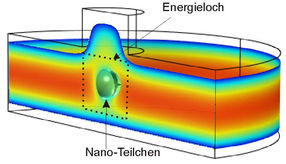Smokers' brains biased against negative images of smoking
Advertisement
What if the use of a product influenced your perception of it, making you even more susceptible to its positive aspects and altering your understanding of its drawbacks? This is precisely what happens with cigarettes in chronic smokers, according to a recent study by the Institut universitaire en santé mentale de Montréal and Université de Montréal.
The study showed that chronic smokers have altered emotional reactions when they are exposed to negative and positive images associated with tobacco. "We observed a bias depending on how smoking is portrayed ", explained Le-Anh Dinh-Williams, a student at the Centre de recherche de l'Institut universitaire en santé mentale de Montréal and the study's first author. "For example, the brains of the smokers in our study were more aroused by images that showed smoking in a positive light than by images that encouraged them to stop. They were also more affected by aversive non-smoking related images than by images of the specific negative consequences of smoking."
In Canada and the United States, approximately 20% of adults smoke cigarettes despite knowing its adverse effects. "We wanted to understand why knowing about the negative health impacts of tobacco does not prevent smokers from lighting up," explained Ms. Dinh-Williams.
Approximately 70% to 95% of smokers who quit their bad habit will, despite their best efforts, start smoking again within one year. "Many factors make it difficult for people to quit. Part of the explanation could certainly be because cigarettes 'trick' the brains of smokers," stated Stéphane Potvin, a co-author of the study and researcher at the Institut universitaire en santé mentale de Montréal and Assistant Professor in the Department of Psychiatry at Université de Montréal. "Specifically, we discovered that the brain regions associated with motivation are more active in smokers when they see pleasurable images associated with cigarettes and less active when smokers are confronted with the negative effects of smoking."
Using neuroimaging techniques, the study researchers compared the emotional reactions of 30 smokers as they looked at aversive smoking-related images (e.g., lung cancer) compared to other aversive images (e.g., an old man on his deathbed) as well as appetitive smoking-related images.



























































